What’s Your Tummy Telling You? 13 Hacks To Float Away Bloat
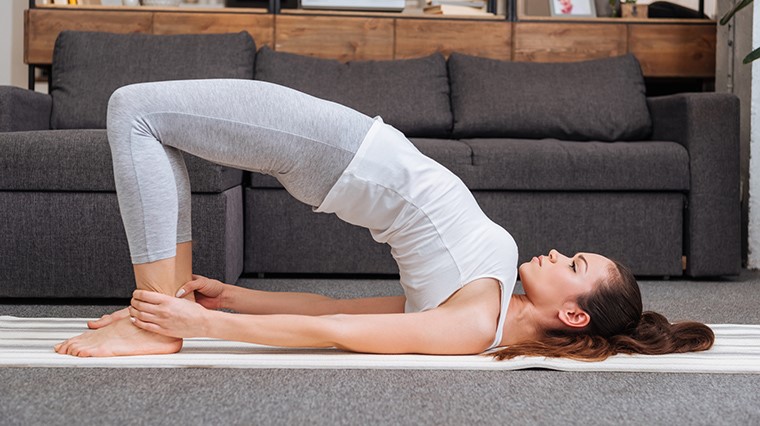
Everybody has experienced it - the feeling of
your guts nearly bursting with air but rather than feeling light like a
balloon you feel yuck and sluggish.
It shows in the mirror with a swollen and distended stomach that makes you cringe at the thought of squeezing into your fave jeans.
Check out our 13 hacks to say bye bye to your ‘air baby’ and
return you to your fun-loving, bloat-free self in no time.
Don’t eat like the cookie monster
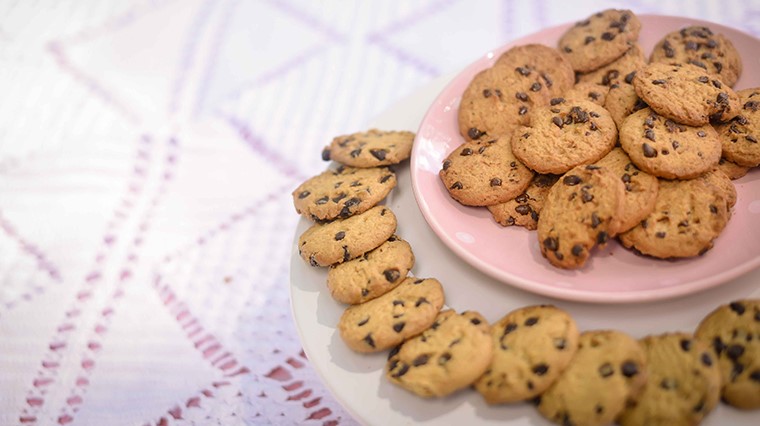
Remember the old school cookie monster shovelling in cookies at a million miles a minute, barely stopping to chew? As cute as that blue fella is, that’s not the way to go to keep the bloat in check.
In this busy world an on-the-go food fix is the norm, but consciously slowing down to eat your meals and practicing mindful eating can save you some pain in the long run.
Beat the bloat tip:
- Eating too quickly and neglecting to chew sufficiently can cause excess air to be swallowed, leading to that balloon bursting feeling in your gut.
Don’t get stuffed
It’s no secret that portion control can be tricky in a world where food isn’t just fuel – the act of eating is also a social activity and way to connect over shared experience.
When you overeat, your tummy stretches beyond what is comfortable, your heart rate rises with the increased effort of digestion and your body may create excess gas.
Beat the bloat tip:
- Rather than piling up your plate sky high three times a day, try consuming several smaller meals to get the energy you need and put less pressure on your digestive system.
- Listen to your gut, but know it can take up to 20 minutes before your mind catches up with your stomach to communicate the feeling of fullness.
- Eating from a salad plate or a small, chic vintage plate rather than a full sized dinner plate can help dictate portion size and make you more aware of your food intake if you go back for seconds.
Increase fibre intake gradually
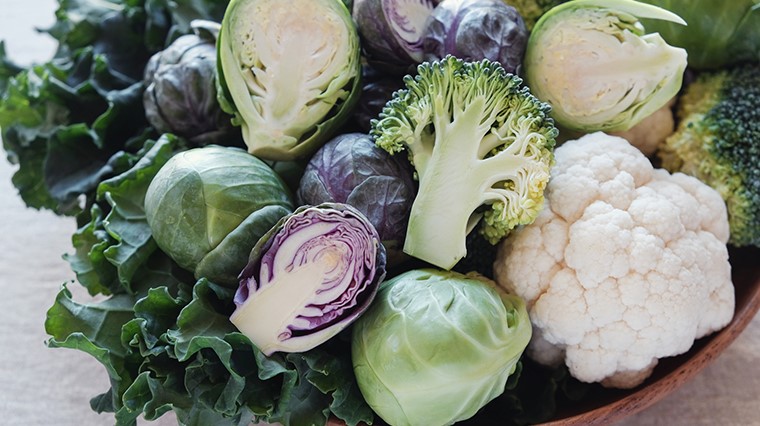
High-fibre foods like wholegrains (e.g. wholegrain bread, brown rice, oats) and cruciferous veggies (broccoli, cauliflower, cabbage, brussel sprouts) are amazing for your body but what makes them so nourishing and good for you can also make you puff up like a polar bear.
Dietary fibre, the part of these plant-based foods that is indigestible by the small intestine, naturally
cleanses your digestive system and adds
bulk to stools to make toilet time go smoothly and prevent you feeling clogged
up.
There’s two types – soluble fibre (absorbs water for softer, more easily
passed stools) and insoluble fibre (doesn’t dissolve in water, but adds healthy bulk
to stool).
When gut bacteria living in the colon (the longest section of your large intestine) break down soluble fibre, excess gas is produced as a byproduct which translates to that tight, bloated feeling in your tum.
Beat the bloat tip:
- Hi-five to you for increasing your fibre intake, but do so gradually to allow your digestive system to adapt to the increased fibre load and to develop a healthy tolerance for less risk of bloating.
- Include a rainbow of plant-based foods in your diet to ensure you're consuming both soluble fibre and insoluble fibre to promote a happy digestive system and reduce risk of certain cancers.
- As always, stay hydrated. Fibre and water go hand in hand in ensuring healthy digestive function.
Start a food journal
Start a food journal to keep track of what foods are most likely resulting in your bloating and experiment with alternative high-fibre options.
As sexy as it sounds, you can also jot down your bowel habits including constipation or diarrhea and whether you're experiencing bloating or excessive gas to start to make connections with the symptoms and foods consumed.
A food diary also may encourage more mindful eating and make you less likely to eat for eatings sake - which let's face it, we all do occasionally due to boredom or mood, the munchies, just because we know the food is there or simply habit.
Beat the bloat tip:
- Some people have a higher sensitivity to certain gas-producing foods such as beans and lentils than others.
- Share your food diary with your doctor to help identify patterns in foods consumed and your digestive symptoms.
Love your guts with probiotics
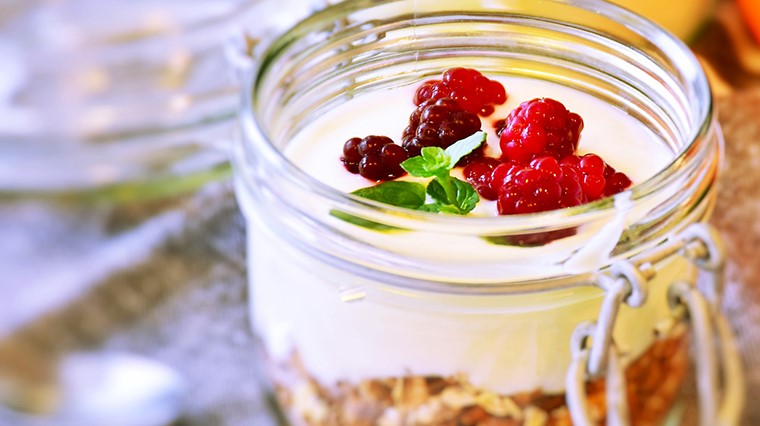
Stress, consumption of unhealthy processed foods or excess antibiotics (which can have a tricky time deciphering between 'good' and 'bad' bacteria) can send your gut health into a whirlwind of tummy pain.
Probiotics, the 'good' bacteria in yoghurt encourage healthy gut function as they restore imbalances in gut microflora and support the growth of further friendly gut-loving bacteria that can aid in digestion.
Topping up active cultures of probiotics like Lactobacillus acidophilus that are naturally present in the human body can help banish the bloat and keep 'bad' gas-causing bacteria in check. But do know that just because bacteria produces gas, doesn't necessarily mean they're the villains in this scenario - many also play a significant role in keeping your gut healthy.
Beat the bloat tip:
- Search for yoghurt with live active cultures on your supermarket shelf and avoid brands that stack on the added sugar.
- Alike with fibre, introducing probiotics into your diet too quickly may cause digestive distress and bloating, particularly if your gut microbiome is significantly out of whack. Doing so gradually is key.
- Yoghurt may cause bloating in those that are lactose intolerant. Greek yogurt is often more easily tolerated by those with sensitivities, but if unsure please check with your doctor.
Stay hydrated
The last thing you want is to add more food or liquids to your guts when they're in crisis, but a well-hydrated body helps lubricate your digestive tract for healthy digestion, keeps your stools soft to slip-and-slide through your intestines and prevent constipation.
If you don’t drink enough water, your body will retain fluids to compensate in an attempt to prevent dehydration. So weirdly enough, drinking more water helps eliminate excess liquids and minimise bloating caused by water retention.
Beat the bloat tip:
- Both salt and alcohol increase your likelihood of water retention, so it’s best to limit your consumption by avoiding high-sodium foods and limit alcoholic beverages.
- Help boost your water intake by consuming hydrating foods such as celery (awesome with hummus), cucumbers, grapefruit, strawberries and watermelon.
Hold off on the bubbles
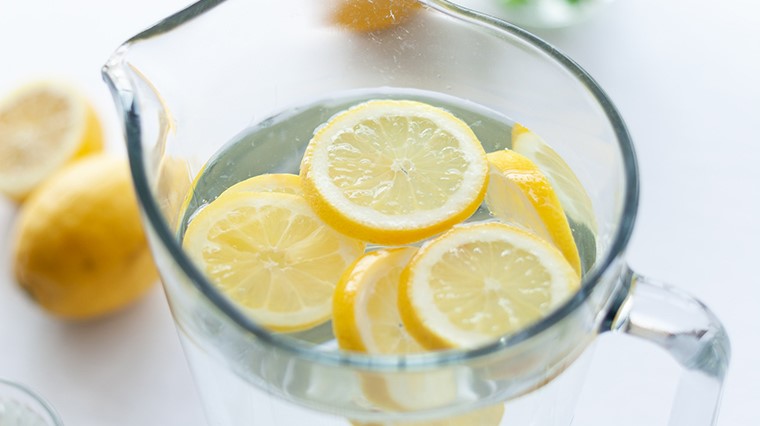
Sparkling water with a hint of lime anyone? Carbonated drinks put a fun fizz on our tongues, but that carbon dioxide gas has got to go somewhere – becoming trapped in your guts and causing particular stress to those with sensitive digestive systems.
Reduce your intake of bubbly drinks like sparkling water, soft drink and champagne by sticking with non-carbonated, good ol’ H20. If you want to give your non-carbonated water a refreshing zing, try adding lemon, lime, mint or cucumber.
Beat the bloat tip:
- Lemon water is known to act as a gentle diuretic (makes you pee) – but be sure to rinse your teeth afterwards with plain water as overtime the citric acid in lemons can wear down your tooth enamel.
- Sipping with a straw (go for eco-friendly, reusable non-plastic options) can help protect your teeth against the citric acid, but also causes you to gulp excess air as you drink, which is a no-no for bloat relief.
Get moving
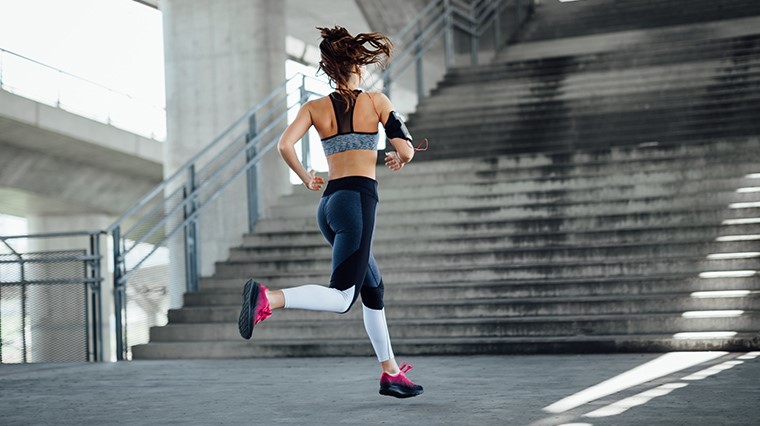
Many jobs keep your bum glued to a chair for hours on end (guilty!) but sneaking in small walk sessions to break up the inactivity helps prevent your digestive system becoming sluggish and acts as a friendly, “Hey, wake up buddy!” to your guts.
Creating healthy habits by exercising regularly helps
improve blood flow and stimulate your digestion, ward off constipation and
provide relief from uncomfortable gas. Aim for at least 30 minutes of physical activity per day.
Beat the bloat tip:
- Many smartwatches/fitness trackers are able to detect periods of inactivity and give you a friendly cue to encourage you to get moving for a few minutes.
- 15 minutes of light physical activity or walking after eating can help your gastrointestinal tract stay active, efficient and provide relief from gas.
Tone down your stress
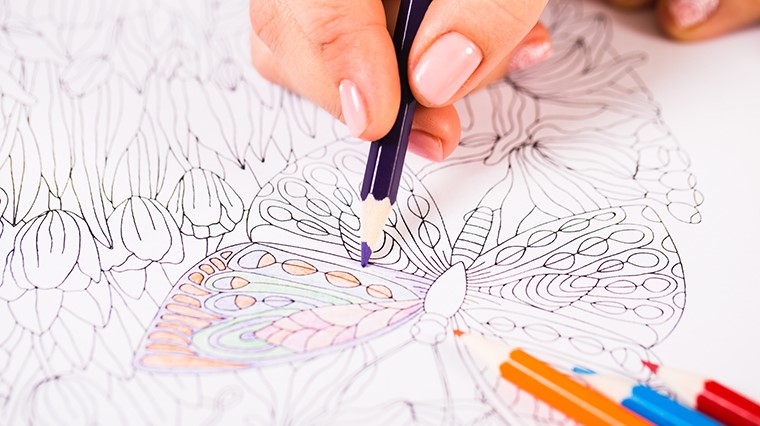
Your body can multi-task pretty darn well but even it struggles to do so under stress, putting you at higher risk of bloating and digestive discomfort.
When your body releases cortisol (the 'stress' hormone), whether it’s due to physical activity like an intense sweat session or anxiety for your big job interview, your natural flight-or-fight response kicks into gear.
Under stress, your body reallocates its energy to support your vital organs and subsequently pull its focus away from your digestive and reproductive system that aren’t immediate priority.
Beat the bloat tip:
- We absolutely recommend exercise as a stress relief option to release feel good endorphins – but be aware exercise itself can also be perceived as a form of stress by the body. Another mind bender right? Learn more about it here.
- Running is super empowering but it’s okay to wind down the intensity by brisk walking or running at a recovery pace, listening to your tunes, curling up with an adult colouring book, meditating or rolling out your yoga mat for some calming ‘me’ time to help your bloat baby float away.
Stretch it out with yoga
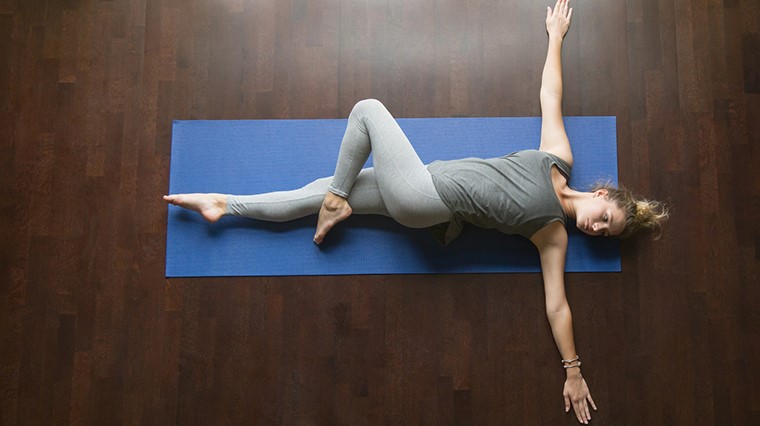
Yoga is a double whammy of bloat-fighting goodness - the mental benefits to de-stress, combined with the physical benefits of stretching and twisting to soothe tummy troubles and gas pains.
Bridge pose (setu bandhasana), child’s pose (balasana) and wind-relieving pose (apansana – the name says it all) are all fantastic for this.
Twist poses such as the supine twist (supa matsyendrasana) contort your abdominal area to firstly reduce blood flow as you ‘twist’ like a knot in a garden hose constricting water flow, then stimulate fresh blood flow to your digestive system as you release the pose to let go of the pressure build-up.
This helps to disperse gas and aids in the elimination of waste to get rid of your constipation woes, phew!
Beat the bloat tip:
- For the gals, once a month when Aunt Flo is in town consider yoga therapy to give your ovaries some love and provide relief from PMS symptoms such as bloating and cramps to help restore your bubbly vibes.
Snuggle up with a soothing tea

If you're thinking, but tea’s just flavoured water, please go sit in the naughty corner. We know it’s not a miracle-in-a-mug to cure all that ails you, but it certainly has proven benefits to relieve bloating and digestive distress.
As a natural diuretic (makes you pee), anti-oxidant green tea helps prevent excess water retention, eases abdominal pain and discomfort from your bloat monster.
Calming chamomile tea helps relieve tension of the GI muscles to let them do their thing to relieve gas and peppermint, ginger and fennel teas all have their digestive, bloat-fighting benefits.
Beat the bloat tip:
- Got the munchies? Rather than reaching for a processed snack, brew up a cosy cuppa as a healthy substitute. Soon enough, this will be your automatic response to your cravings and assuming you keep your tea unsweetened, this self-conditioning can help you slim down, ease digestive issues and help you enjoy healthy living.
- For those with caffeine sensitivities or that experience sleeping difficulty, it may be beneficial to avoid caffeinated drinks after 2pm or up to 6 hours prior to bedtime.
Sleep it off

Sleep is healing and restorative – an essential part of everybody’s well-being. It’s no surprise that inadequate or poor quality sleep can be detrimental and releases the 'stress' hormone cortisol, putting our digestion and other processes out of whack.
While you're asleep your body conserves energy and its requirement for glucose (energy) is greatly decreased, meaning the demands on your digestive system to break down food isn’t as high.
When you’re awake and the need for energy rises, your guts can function more efficiently having had this well-deserved 'chill' time to repair and rejuvenate.
Beat the bloat tip:
- Set a bedtime alarm 15 minutes before cocooning up in the sheets to give yourself a reminder it’s nearly time to catch your Zzz.
- No sneaky midnight donut binges! Bedtime is not the time to overload your guts with a big task of digestion - give them a break.
- Not enough sleep boosts your carb cravings, putting you at risk of overdoing your next meal and being stuck with that stuffed, bloated feeling.
Check in with your GP
Occasional bloating can be a normal, harmless part of life – but it’s important to know your body and seek the help of a medical professional if you chronically experience bloating or suddenly suffer from bloating when it’s out of character for your body and seemingly for no discernible reason.
When bloating is accompanied by unexplained weight loss, diarrhea, bleeding, a consistent change in bowel habits or other concerning symptoms, it’s definitely time to book an appointment with your GP.
Beat the bloat tip:
- Your doctor may be able to rule out conditions such as irritable bowel syndrome (IBS), celiac disease or other food intolerance (e.g. lactose) and provide advice on how to manage bloat for your body.
